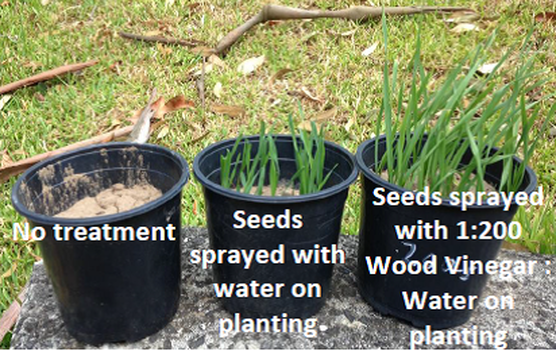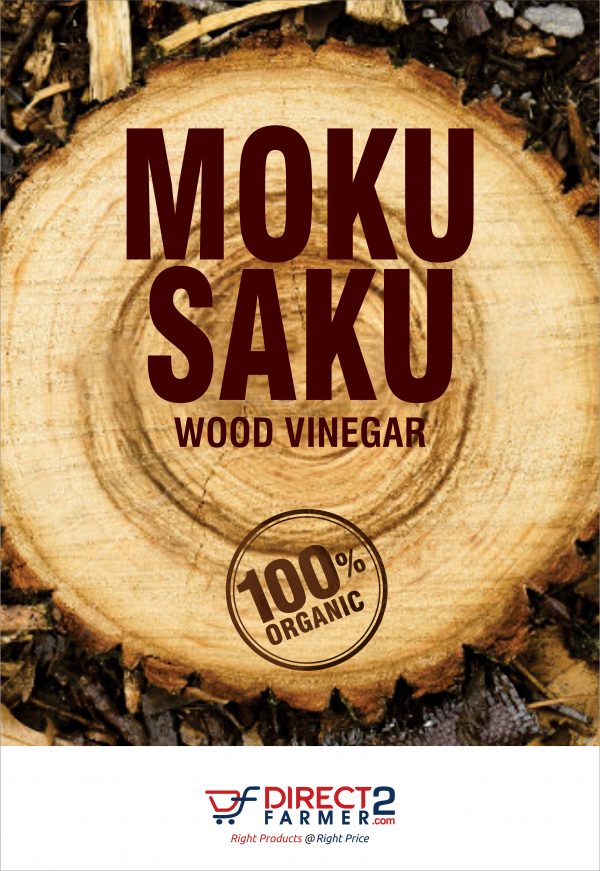₹450.00 – ₹9,375.00
Mokusaku
Description
Wood Vinegar for Agriculture
Wood Vinegar is a natural extract from woods. It is used in agriculture and animal fodders. It is a good choice for organic farming. The natural contents make it an attractive alternative to chemical pesticides and fertilizers. Furthermore it is non-toxic and biodegradable.
There is a growing organic and sustainable supply source from an emerging char production industry allowing a reduced dependency on limited expensive agri inputs. The extensive use of Wood Vinegar for agriculture throughout other regions for many decades along with positive trial results leads to a product that can potentially be farm input cost neutral or even negative while improving production results.
How Wood Vinegar Benefits Agriculture
Wood vinegar reduces the cluster value of water to 1/3. This means that the water is activated and can be easily absorbed by the plants and animals because water with a low cluster value is in a very small mass. Each of these masses will hold one or few mineral elements. These elements can be easily taken into the plants. This will greatly reduce the use of agro-chemicals. However, it should not be used with alkaline chemicals.
Advantages and Benefits of Wood Vinegar as Fertilizer:
- Improve absorption through the roots when given to root area at 1:100
- Stimulates plants and vegetable growth
- Strengthens roots and leaves
- Increases the quantity of useful microbes
- Increased soil microbial weight
- Used as penetrant for better uptake.:1:500 of dilution water
- Increase crop resistance to adverse condition.
- Improved tree health, darker green leaves for better photosynthesis, thicker and stronger stems, higher growth rates, naturally more resistant to disease.
- Improves fruit quality and increases sugar content in fruit, and stimulate development of crops
- Improve flavor, color, firmness and preservation of fruit
- Works as flavor enhancer for agricultural end products: Mix solution rates of 1:500 to 1:1000. Wood vinegar prevents excessive nitrogen levels, improves plant metabolism and contributes to higher fruit sugar levels.
- Strengthen the photosynthesis
- Increase the content of chlorophyll of the plants
- Reduced fertilizer or other agrochemical volume used with better yields in viticulture and grain crops
- Foliar spray: Dilute one part wood vinegar with 200 parts water and spray it to leaves once a month. Dilution ratio can be change to 300 parts water for the succeeding applications. Allows better uptake and a reduction of up to 50% use of fertilizers, herbicides and pesticides
Advantages and Benefits of Wood Vinegar as Pesticide:
- Repel pests, prevent plant infection from fungal, bacterial and virus-like disease
- Inhibits virus and soil disease when mixed in high concentration
- Repels insects on plants (or deodorizer): Dilute one part wood vinegar with 20 parts water and spray it the plant or to the substrate in case of odor removal
- Prevents diseases caused by bacteria
- Reduce odor: A wood vinegar solution of 1:50 will diminish the production of odor-causing ammonia in animal pens.
- Repel houseflies. Dilute wood vinegar at a rate of 1:100 and apply to affected areas.
- Repel nematodes: 1:500 (apply to the base of plants)
- Control of fungal diseases: 1:200 (spray onto leaves)
- Control of root rot: 1:200 (apply to the base of plants)
- Reduce incidence of chili pepper flowers aborting: 1:300 (spray onto leaves)

Advantages and Benefits of Wood Vinegar to Enrich Soil:
• Enriches soil fertility: Dilute wood vinegar with water (1:200 ratio -1 part wood
vinegar and 200 part water) and sprinkle it to the soil before planting.
Application is one liter solution for every square meter of planting area.
• Enrich garden soil: Use a strong solution of 1:30 to apply to the garden soil
surface at a rate of 6 liters of solution per 1 m² to enrich the soil prior to planting crops. To control soil-based plant pathogens, use an even stronger rate of 1:5 to 1:10.
Other Advantages and Benefits:
• Facilitates composting: There is a growing number of farmers and commercial
soil compost producers looking at ways to improve their composting processes while reducing costs and improving the end product. Dilute one part wood vinegar with 50 parts water and sprinkle to composting materials daily. This will help increase the biological activity of various beneficial microbes and can decrease composting times.
• Seed Germination: Nourishes seeds for germination (Improve seed germination strike rate): Dilute 1 part wood vinegar with 200 parts water then soak the seeds for 24 hours. More seeds sprout when soaked in wood vinegar first.


Reviews
There are no reviews yet.